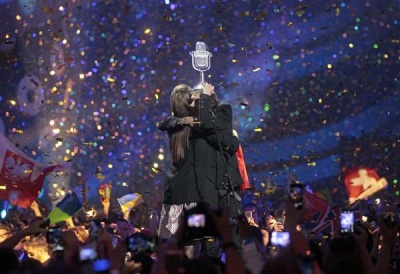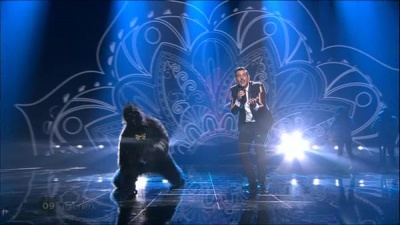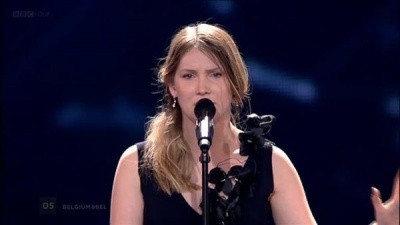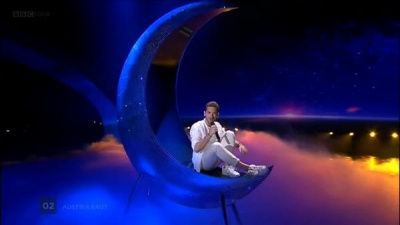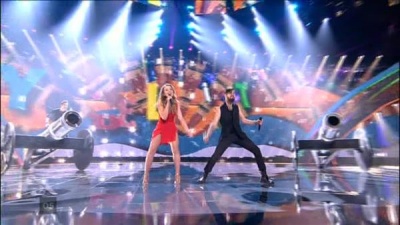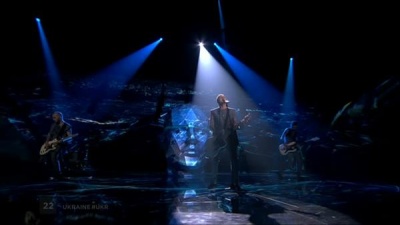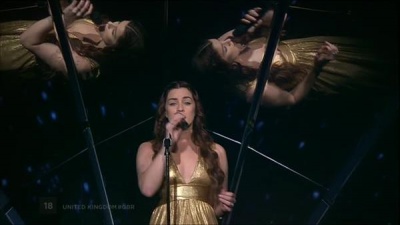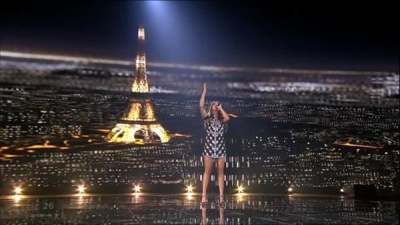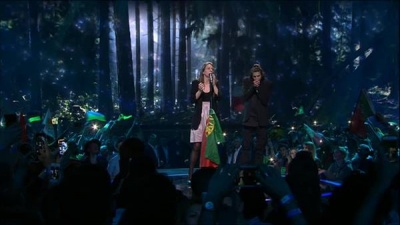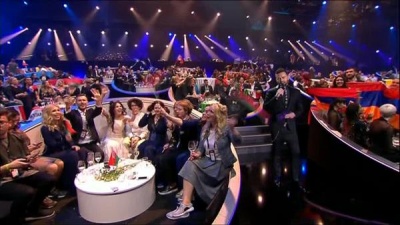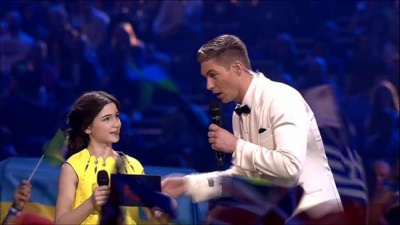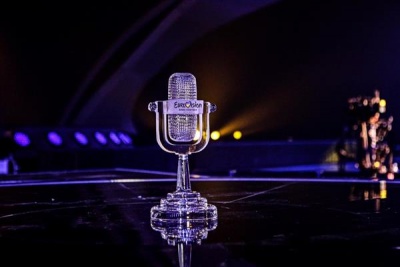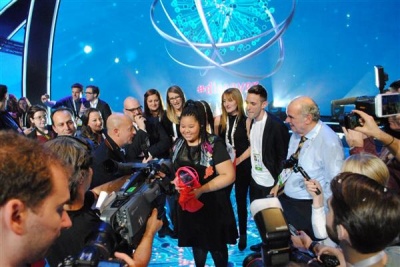Weaver's Week 2017-05-21
Last week | Weaver's Week Index | Next week
Contents |
Eurovision Song Contest
NTU / EBU, shown on BBC1, 13 May
"Amar pelos dois" won the Eurovision Song Contest, performed by Salvador Sobral. That becomes a team best for RTP.
RTP have been at this Eurovision thing for over 50 years. They've never won anything. They've never even come close. RTP's previous best at the senior Song Contest was sixth in 1996. Their two performances at Junior Eurovision both missed the top ten. They have never finished in the top three of Young Dancers, nor of Young Musicians.
RTP has been waiting forever to celebrate a top five finish. Even before the show, their entry had scooped two of the Marcel Besançon awards. They took the Artistic award (voted by national commentators), and songwriter Luisa Sobral took the Composer award. The Press award went to "Occidentali's karma" by Francesco Gabbani.
We described "Amar pelos dois" as like relaxing into a warm bubble bath, with candles all around the outside, a good book, and a glass of sweet wine. It's comfortable, it's nostalgic, it gets into the parts other songs don't reach. Salvador and Luisa knew what they wanted to achieve with their song, and worked together to make it happen. They had a vision, and followed it to its limits.
Favourite buried
Going into the final week, "Occidentali's karma" was the prohibitive favourite, RAI looked like the host broadcaster. But what had exploded in San Remo fell flat in Kyiv. At San Remo, the song looked elegant and suave, the dancing gorilla added to the style of the song. On this big stage, in this company, it looked tacky. Losing the second verse meant the staging was more gimmick than build.
The producers gave "Occidentali's karma" no favours, drawn in a run of strong songs. First in the run was the tremendous lyrical dance number "Origo". We didn't need to know the words to feel Joci's passion, to see the drama he played out. Eighth place was a good reward. Then came Franceso Gabbani.
Afterwards? "Hey, mamma", the Sunstroke Project featuring Epic Sax Guy. A zillion memes were born, and TVM finished in third place - strong with the juries, very strong with the voting public. We still don't get the song, we're missing out.
Following that, the complete change of pace for "Amar pelos dois". And then another arthouse presentation, "Skeletons" featuring the chalkboard walls and the guy on a stepladder wearing a horse's head; it finished fourteenth. RTP's entry stood out like a sore thumb, a calm oasis in a storm of riotous colour. RAI's was overshadowed by the rest of the storm, a favourite that couldn't win.
Teen sensations
"Beautiful mess" finished second overall, and in a weaker year could have won outright. Kris Kostov is an absolute star already, he exuded confidence from every single pore in his body. He had conviction, he looked good on the stage, and his song would sound good on the radio if Richard Park deigned to play it. By not winning, Kris has set up a career story arc: go away, come back, perhaps present Junior Eurovision in a few years, and come back to upstage Justin Intervalact by wearing a light-up suit.
After "Hey, mamma" came "City lights", the third stonkingly good entry in a row from RTBF. It's a fragile number, Blanche is alone in a cold city, and is hiding her fear. Think back two years to Loïc Nottet, the meme of his year. Think back four years to Roberto Belarosa, whose shyness was turned into a massive plus. We've still got "Love kills" and "Rhythm inside" on our fruit-based music player, and "City lights" will remain a core song for the next four years.
"City lights" was as popular with the people who buy singles as the winner "Amar pelos dois". This reflects the televote result closely. The people at streaming service Spotify worked out the most popular international song amongst their users, and found it was "Running on air" by another young star.
Nathan Trent's adequate number lived down to expectations. The juries gave it an adequate mark, but the televoters had nothing of it. Literally: "Running on air" scored nothing from the televote. There is a bigger debate in the music industry at the moment: does streaming really reflect genuine consumer demand, or is it being manipulated? This is only one slice of evidence, but it plays into the narrative that streaming's numbers are like the "San Marino televote": fabricated, false, made-up.
Of the other young performers, the identikit scandipop of "I can't go on" finished fifth for Robin Bengtsson. Jowst finished tenth with "Grab the moment", perhaps too modern for the voting audience.
O'g3ne are the new Wilson Phillips on "Lights and shadows", the classy number finished 11th. They may be teens, but they don't sing like teens. Much earlier, the show was opened by "I feel alive", Imri was completely forgotten and came 23rd.
Hovig's "Gravity" was more identikit Scandipop and a disappointing 21st. Three places higher for Isaiah's "Don't come easy", another jury fave. He did beat the other Australian passport, Anja's "Where I am" came 20th.
Would the final be better if trimmed to 24 songs? That would have cut "Where I am" and the 19th-placed "This is love". Two pieces of filler sacrificed for an extra seven minutes at the end of the show? We might take that trade.
Novelty entries
What did better with the voters than the juries? "Yodel it!", the non-firing glitter canon are this year's entry to the "Love love peace peace" lyric. Seventh overall, and a million clip reels await. Clip reels also await for "Story of my life", Naviband flying through the air and singing a joyful number - who cares that it's in Belarussian, we feel the emotion.
We'll see a lot of "My friend", Jacques Houdek's duet with himself. A tremendous technical performance, the juries barely gave any marks but the televoters gave the entertainment its due.
Diaspora effects didn't happen this year. "Flashlight" was meant to bring in three squillion Polish expat televote points, but barely cracked three dozen to finish 22nd. This pick ruined our entry for Tom Flynn's Top Half Pool. "Fly with me" got less than twenty from the Armenian diaspora, leaving Artsvik 18th. They may live on in clip shows, particularly if researchers confuse "traditional ethnic dancing" with "comedy".
Straight to the final: a curse, not a blessing
Three of the other automatic finalists finished in the bottom three places. Stone last was "Do it for your love", Manuel Navarro's surfer vibe was overshadowed by everything else. "Perfect life" failed to trouble the juries at all; Levina's points all came from viewers in the Portugal televote who found a certain familiarity to the titanium-flecked performance.
"Time" was the host broadcaster's entry, O Torvald sang the rock number with a big giant head on stage. A big giant human head, not a lovely horse. "Requiem" was the last performance, and Alma surprised with a confident disco number starring the Eiffel Tower. Top half finish feels about right.
"Never give up on you" finished fifteenth. The BBC's entry went exactly as we expected. Top ten on the jury votes, because it is a high-quality song performed by a high-quality singer. And naff all on the televote, because the BBC still doesn't know how to connect with the audience at home.
The inspiration was Botticelli's "Birth of Venus" painting, and the performance did look like a Renaissance painting. That's a problem, because Renaissance paintings are hundreds of years old. There's nothing in the lyric or the emotions that leads us to think of reflections, or Venus, or anything we saw on stage.
What could the BBC have done better? A more fluid, dynamic staging, or one that had some vague relevance to the song. Lucie in a harsh spotlight is the first staging we thought of: so simple it's too obvious. Then we look at the message. It's a song about companionship, about being stronger together, a meditation on achievement and progress.
Have Lucie standing still in a harsh spotlight, and add a dancer as her companion. The dancer flits around the edge of the stage, perhaps getting closer to Lucie at some points before running away. Every shot starts or finishes with Lucie as the focus. As the song grows, make us believe that Lucie is a rock for the dancer, a stable point to dance around.
And that's just one option, something a rank amateur has designed in a few minutes. Professional choreographers could do something far better.
Once again, the BBC have selected a wonderful song, but the staging has been entirely subpar. Last year, "You're not alone" was marred by a distracting background. Two years ago, "Still in love with you" was ruined by a wholly inept idea. And the trail of poor staging stretches back further, "Children of the universe" and "I am" were good, perhaps the last great BBC staging was "It's my time" in Moscow 2009.
Let's give a lot of credit to the song-finding team: they've got it right. The songs are there, BBC viewers had a choice between three songs of equal merit. But the staging is consistently weak, and it's getting no better.
The missing link
Missing from the party was C1R. For the first time since the days of Boris Yelstgin, no broadcaster showed the contest to the "Russia" broadcasting territory. Those at the contest said it was a bit different, more relaxed and less tense.
Too often, the broadcaster's label is identified with policies of the government, and every time we've heard "Russia" called lately, it's been to a chorus of jeers. This reached a nadir in 2015, when the hosts called for the crowd to not be so beastly, and fabricated applause to cover up jeers.
None of that happened this year. C1R took its song home and didn't take part. They were not missed. Eurovision Song Contest is a bustling city street, this year without the sirens from that broken burglar alarm. Only when we stop and think do we realise the cacophony is different.
The winner's speech
By new tradition, the winner offers thanks to the viewing public. This year, Salvador Sobral gave a rehearsed speech about "real music" and "disposable music". This felt out of place.
On one level, Salvador implies that the songs he was up against were all disposable music. This is patent nonsense: the Eurovision Song Contest is full of deep and meaningful moments. Francesco brought zen into the mainstream for the first time since Bod. Joci gave a meditation on exclusion. Dihaj had an insight into places that scare us. Jowst saw the future, Og3ne reflected the past, Blanche captured the present.
Does he have a point about global pop music? There, perhaps, he might. Pop factories churn out easy songs, all hook and chorus and no substance. Their allies, the record companies and Richard Park and Spotify, promote the fast hit over the rewarding. Jax Jones, from the current pop charts, makes an empty song that goes "na na na hey hey" over a bouncy rhythm. It wouldn't get out of the semi-final here. Rihanna's lack-of-quality control allows her to be ubiquitous for a decade, but who can sing more than two of her hits?
Look back over the past dozen Eurovision winners. You'll see songs about giddy love ("Euphoria", "Satellite") and about failing love ("Only teardrops", "Running scared", "Fairytale"). You'll see songs about personal belief ("Amor pelos dois" joins "Heroes", "Rise like a phoenix", "Believe", "Molitva"), about historical truths ("1944"). Not since "Hard rock hallelujah" has the winner been entertainment with no deeper meaning. The Eurovision Song Contest is full of profound music.
#CelebrateDiversity
A few words on this year's motif, the commandment to celebrate diversity. Let people be true to themselves, there's no need to force everyone to go down the same path.
Across this year's 42 entries, we had many performance styles. Pop from teenage boys, women full of emotion. We had interpretative dancing, joyful dancing, and gorilla dancing. There were intimate numbers, grand numbers, whispered words, shouted orders. No two songs were the same, few were similar.
BBC commentator Graham Norton noted that there were few non-white faces last Saturday. True: a few backing singers and dancers broke the all-white faces. But this is an over-simplistic analysis, it ignores the way cultures define race in Europe. On this continent, "race" is defined by ethnicity and religion. MTV's entry - a song written and performed by Roma - stands as the most obvious example.
Norton's simple words ignore other points of diversity. Sexuality was not mentioned, not alluded to. The Eurovision Song Contest is a safe space for cis white gay men; we need to remember that they are not the only minority.
Intersectionality is the social justice concept of the 2010s, it's been embedded in this contest for years. Wake us up when the Eurovision Song Contest welcomes a trans Jewish woman? Eurovision has been woke for the past twenty years.
The work of diversity is never done. The BBC warns of flashing images that may cause photo-sensitive epileptic seizures, but it doesn't warn of flashes that are close to that automated line. The fashion this year was for songs in Poplish, that international variant of English used by pop songs. Maybe there will be more songs in other languages next year.
Closing thoughts
Some other notes. The shot direction was superb: cameras were high above the crowds, and flags were kept to a low height. The problems of Copenhagen were not repeated: great shots were not blocked by flags. There were little interstitials during the performances, giving us a break every few songs, enough to interrupt the vam-vam-vam treadmill and help us to keep focus.
The active voting window was 40 minutes, and that still feels a bit too long. Mariam Madashvili turned up to promote the Junior Eurovision Song Contest (shine bright on 26 November: mark your calendars!) and proved to be the best host of the night. Alex and Vlad improved as the night went on, and - apart from some clunky flirting with spokespeople - handled the voting well.
At this point, we traditionally give a map of which juries and televoters have been voting for each other. We've not done this, not just yet. With four years of complete rankings from 1 to 26, we have a wealth of data, and only following the top ten may not be the best use of it. We need to go away, think about how to handle this extra information, and present something later in the year.
Did the best song win? That's not the question. Are we comfortable with "Amar pelos dois" going down as the winner? When we look at "Eurovision Song Contest 2017", will the sight of Salvador be a fair summary? All things considered, yes, we are comfortable.
And did we have a fine evening? It was long, it was draining, and we'll do it once more. Next year, in Lisbon.
Brain 2017
The 63rd champion of Radio 4's Brain programme was crowned this week.
John Beynon threw down the gauntlet in the first round, scoring a perfect five. Nothing is a gimme in the final, and knowing that weathercocks pay tribute to St Peter helped on his way. He also picked up a bonus from Michael Penrice's final question: after just one round, a 7-5 lead.
Justice is served when John zigs with "Henry VI Part 1", only for Michael to nick the point with "Henry VI Part 2". Michael also gets the bonus on how many "Now! That's What I Call Music!" albums there have been: William was one off with his offer of 95. And Michael knows about the main ingredient of Finnish soup lohikeitto.
After three rounds, it's become a two-horse race, with John and Michael level at 11 points. John suggests that traders drive sheep over Westminster Bridge; William Barney picks up the bonus, they go over London Bridge. Michael has taken a 12-11 lead.
John knows about Simon and Garfunkel albums, Michael fumes with himself for not recalling the Thalos icon. John has a 14-13 lead. Tørshaven in the Faroes, and the parrot in The Ladykillers, two bonuses to Michael and the lead. Get the music question right and he should win - but can we squeeze in a seventh round? We can.
Warm-blooded animals allow John to pull level, and at the end of his round, he's pulled a couple ahead. Can Michael grab something to pull further ahead? He cannot.
The final scores:
- Diane Hallagan 4
- William Barney 5
- Michael Penrice 15
- John Beynon 18
This Week and Next
The main ingredient of lohikeitto? It's potatoes. We have no evidence that it's best served with ruskeakastike.
Destiny Chukunyere won the Junior Eurovision Song Contest in 2015. We were peeved that she didn't sing at last year's Senior contest, presumably so that she didn't upstage Justin Timberlake. As viewers to This Territory's Got Talent now know, we're not being entirely facetious. Destiny appeared on the show last night, wowed the judges, and we'll doubtless see her again.
What did we say about her winning song, "Not my soul"? "Being in English, this song could fit straight onto a UK radio playlist. Being utterly brilliant, it won't."
BARB ratings in the week to 7 May.
- Britain's Got Talent (ITV, Sat) the top show, seen by 10.95m viewers.
- Over on BBC1, Masterchef was in the semi-final, seen by 5.65m (Thu). Have I Got News for You pulled 4.95m (Fri). Pointless Celebrities (Sat) had 4.25m, Pointless (bank holiday Mon) 4.05m.
- BBC2 features Bake Off Crème de la Crème (2.5m Tue), the new series of Great British Menu (2.05m Tue), and Celebrity Eggheads (1.3m Fri). Catsdown brought 1.05m to C4 on holiday Monday.
- As you were on the digital tier: Celebrity Juice (ITV2 Thu, 1.325m), Britain's Got More Talent (ITV2 Sat, 870,000), and Taskmaster (Dave Tue, 765,000). Take Me Out The Gossip (ITV2 Sun, 575,000) also over half-a-million.
This week: new series of !mpossible (BBC1, weekdays), and The 3rd Degree (R4, Mon). Master of Photography also returns (Artsworld, Thu).
Photo credits: NTU/EBU, PBS/EBU.
To have Weaver's Week emailed to you on publication day, receive our exclusive TV roundup of the game shows in the week ahead, and chat to other ukgameshows.com readers, sign up to our Yahoo! Group.

